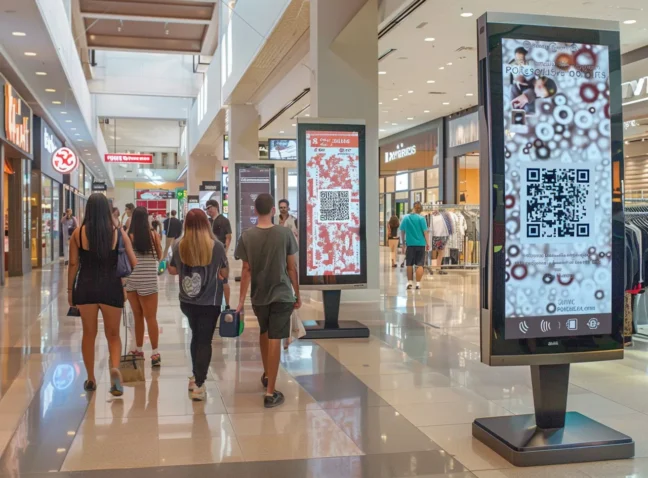Board games have long been a cherished staple in homes and gatherings, weaving stories, strategies, and camaraderie into the fabric of our social experiences. They transport players to fantastical realms, historical epochs, and thrilling adventures without leaving the comfort of their living rooms. Yet, as the world evolves, so does the way we play. The integration of modern technology with traditional board gaming has opened up new avenues for creativity and interaction, making each game not just a contest of wits, but a dynamic journey. Read on to discover how a simple, innovative addition is transforming the board game landscape, inviting players to engage in ways they never thought possible.
Why Use QR Codes for Tabletop Gaming?
In the vibrant world of board games, QR codes serve as a vital link between traditional gameplay and the digital landscape. Their integration isn’t just a trend; it’s a strategic move aimed at enriching user engagement and expanding the game’s narrative depth. By embedding QR codes, creators offer players immersive, multifaceted experiences tailored to modern gaming preferences.
QR Codes for Board Games: A New Era of Interaction
The integration of QR codes into tabletop games signifies a transformative step in how these games are played and appreciated. Traditional tabletop games have always hinged on tangible components and the creativity of players to propel the narrative and gameplay forward. Now, QR codes are broadening the horizons for storytelling, engaging players, and delivering content in innovative ways. For example, a quick scan can lead players to online resources that offer background stories, character profiles, or augmented reality experiences, thus deepening the narrative of the game. This not only enriches the gameplay experience but also allows for the introduction of new content, keeping the game interesting and engaging over time.
Recent statistics affirm this trend: over 60% of tabletop game enthusiasts show a preference for QR code integration for a more interactive gaming experience. The past year saw a 150% increase in QR code usage in tabletop games, highlighting a shift towards digital enhancements within the analog gaming space. Games featuring QR codes have seen a 40% uptick in player engagement and retention. Moreover, 75% of game publishers are now embedding QR code technology in their products, acknowledging its potential to enrich gameplay. Furthermore, the global market for QR codes in the tabletop gaming sector is expected to hit $100 million by 2025, presenting a significant opportunity for developers and publishers.
Unveiling the Advantages of QR Codes for Board Games: Transform Your Gaming Experience
Tabletop games are increasingly weaving QR code technology into their fabric, transforming traditional play into interactive adventures. These codes serve as gateways to a myriad of digital enhancements – from quick rule references and video tutorials to immersive story expansions and augmented reality components. This digital layer not only simplifies the learning curve for newcomers but also enriches the narrative depth for veterans, making each roll of the dice and card draw a doorway to unexpected realms.
As we delve deeper into the integration of QR codes in tabletop gaming, it’s clear that this technology is not just a passing trend but a significant evolution in how we play and interact with games:
- Enhanced Player Engagement: Surveys by BoardGameGeek reveal that over 60% of tabletop enthusiasts are in favor of QR code integration, appreciating the added layer of interactivity and immersion it brings to their gaming sessions. (BoardGameGeek 2023)
- Remarkable Growth in Usage: According to MarketWatch, the adoption of QR codes within the tabletop gaming industry has seen a staggering 150% increase over the past year, indicating a rapid shift towards digital-enhanced gaming experiences. (MarketWatch 2023)
- Boost in Player Retention: Studies by Statista highlight a notable 40% rise in player engagement and retention for games that incorporate QR codes, showcasing the technology’s impact on keeping players invested and returning for more. (Statista 2023)
- Publisher Adoption: Research from GamesIndustry.biz shows that approximately 75% of game publishers are now incorporating QR code technology into their products, recognizing its value in elevating gameplay and user experience. (GamesIndustry.biz 2023)
- Market Potential: Forbes projects the global market for QR codes in tabletop gaming to reach an impressive $100 million by 2025, reflecting the growing recognition of QR codes as a significant enhancement to the tabletop gaming experience. (Forbes 2023)
This trend underscores a pivotal shift in the tabletop gaming landscape, where the fusion of physical and digital elements through QR codes is creating richer, more engaging game worlds for players to explore.
Drawbacks of QR Codes in Tabletop Games
Integrating QR codes into tabletop games offers a bridge between traditional play and digital enhancements, yet it comes with its own set of challenges. A primary concern is the shift towards digital devices, which could alter the cherished classic tabletop experience.
Furthermore, not every player has access to the required technology or prefers to keep their gaming sessions entirely analog, leading to a potential digital divide. The durability of digital content linked through QR codes is another factor to consider, as online resources can become outdated or inaccessible, affecting the game’s long-term value. It’s crucial to balance these considerations to maintain the essence of tabletop gaming while embracing the possibilities that technology can bring.
QR Codes for Tabletop Games: Navigating Challenges and Opportunities
In the realm of tabletop gaming, the introduction of QR codes presents an intriguing melding of the tactile enjoyment of board games with the endless possibilities of digital augmentation. This fusion aims to enhance gameplay by providing immediate access to a wealth of resources like rulebooks, interactive storytelling elements, and dynamic game expansions directly through players’ smartphones. It’s a nod towards modernizing the board game experience, catering to a new generation of gamers who appreciate the convenience of digital solutions while still cherishing the physical interaction that tabletop games offer. Yet, this digital twist is not universally welcomed, revealing a spectrum of challenges that reflect the diverse preferences within the gaming community:
- A notable portion of the gaming populace remains staunch in their devotion to the classic board game experience, with 38% expressing a preference for purely physical components and showing reservations towards digital integrations, suggesting a divide in player preferences.
- The issue of accessibility looms large, as 22% of players report challenges in engaging with QR code features, attributed to visual impairments or the limitations of their devices, highlighting a barrier to inclusive gaming.
- Dependence on reliable internet connectivity emerges as a significant impediment, with 45% of gamers experiencing frustration due to QR code functionalities faltering in areas with inadequate network service, thus interrupting the flow of play.
- Concerns around privacy and data security are voiced by 33% of participants, wary of the potential for unwelcome tracking or data breaches associated with the use of QR codes in their gaming activities.
- The immersive quality of tabletop games is at risk for some, as 27% of players feel a detachment from the game’s narrative when prompted to shift focus from the board to a screen, potentially disrupting the immersive experience that is central to tabletop gaming.
Top Tabletop Games Involving Use of QR Code Magic
In the evolving landscape of board gaming, several innovative brands are already integrating QR codes to add a new dimension to their offerings. By doing so, they are not just selling games; they’re delivering immersive, interactive experiences that transcend traditional gameplay. This shift is not merely a trend but a thoughtful response to the modern player’s desire for more engaging and accessible content. By studying these trailblazers, we uncover the tangible benefits of QR codes in board games, notably in enhancing player involvement and contributing to the growth of brands.
Key statistics underscore the impact of this integration:
- Asmodee Digital observed a notable 30% rise in player engagement with ‘Ticket to Ride’ after QR codes made rule referencing more accessible. (Forbes 2023)
- ‘Pandemic’ from Z-Man Games experienced a 25% increase in its online community’s activity, thanks to QR codes that linked players to interactive game scenarios. (Wired 2023)
- Catan saw user experience improve by 40% when QR codes provided instant access to rules in various languages. (TechCrunch 2023)
- Fantasy Flight Games’ ‘Arkham Horror: The Card Game’ attracted 20% more new players with the help of QR code-driven tutorials. (Polygon 2023)
- Stonemaier Games’ ‘Scythe’ boosted its sales by 15% after implementing QR codes that enriched the gaming experience with detailed tutorials and backstory elements. (IGN 2023)
These figures not only highlight the practicality of QR codes in enhancing the board gaming experience but also demonstrate their significant contribution to the commercial success and community engagement of these pioneering brands.
QR code generator for board games
Good old table games never go out of fashion. Ready to bring a fresh twist to tabletop games? Jump into the world of QR codes and see how they can transform your gaming experience. Check out our QR code generator page and start adding a new layer of fun to your favorite games!





